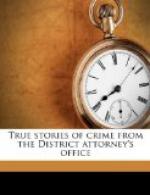William M. Rice, eighty-four years of age, died at the Berkshire Apartments at 500 Madison Avenue, New York City, at about half after seven o’clock on the evening of Sunday, September 23, 1900. He had been ill for some time, but it was expected that he would recover. On or about the moment of his death, two elderly ladies, friends of the old gentleman, had called at the house with cakes and wine, to see him. The elevator man rang the bell of Mr. Rice’s apartment again and again, but could elicit no response, and the ladies, much disappointed, went away. While the bell was ringing Charles F. Jones, the confidential valet of the aged man, was waiting, he says, in an adjoining room until a cone saturated with chloroform, which he had placed over the face of his sleeping master, should effect his death.
Did Jones murder Rice? If so, was it, as he claims, at the instigation of Albert T. Patrick?
These two questions, now settled in the affirmative forever, so far as criminal and civil litigation are concerned, have been the subject of private study and public argument for more than seven years.
Mr. Rice was a childless widower, living the life of a recluse, attended only by Jones, who was at once his secretary, valet and general servant. No other person lived in the apartment, and few visitors ever called there. Patrick was a New York lawyer with little practice who had never met Mr. Rice, was employed as counsel in litigation hostile to him, yet in whose favor a will purporting to be signed by Rice, June 30, 1900, turned up after the latter’s death, by the terms of which Patrick came into the property, amounting to over seven million dollars, in place of a charitable institution named in an earlier will of 1896. It is now universally admitted that the alleged will of 1900 was a forgery, as well as four checks drawn to Patrick’s order (two for $25,000 each, one for $65,000, and one for $135,000, which represented practically all of Rice’s bank accounts), an order giving him control of the contents of Rice’s safe deposit vaults (in which were more than $2,500,000 in securities), and also a general assignment by which he became the owner of Rice’s entire estate. Thus upon Rice’s death Patrick had every possible variety of document necessary to possess himself of the property. Jones took nothing under any of these fraudulent instruments. Hence Patrick’s motive in desiring the death of Rice is the foundation stone of the case against him. But that Patrick desired and would profit by Rice’s death in no way tends to establish that Rice did not die a natural death. Patrick would profit equally whether Rice died by foul means or natural, and the question as to whether murder was done must be determined from other evidence. This is only to be found in the confession of the valet Jones and in the testimony of the medical experts who performed the autopsy. Jones, a self-confessed murderer, swears that upon the advice and under the direction of Patrick (though in the latter’s absence) he killed his master by administering chloroform. There is no direct corroborative evidence save that of the experts. Upon Jones’s testimony depended the question of Patrick’s conviction or acquittal, and of itself this was not sufficient, for being that of an accomplice it must, under the New York law, be corroborated.




